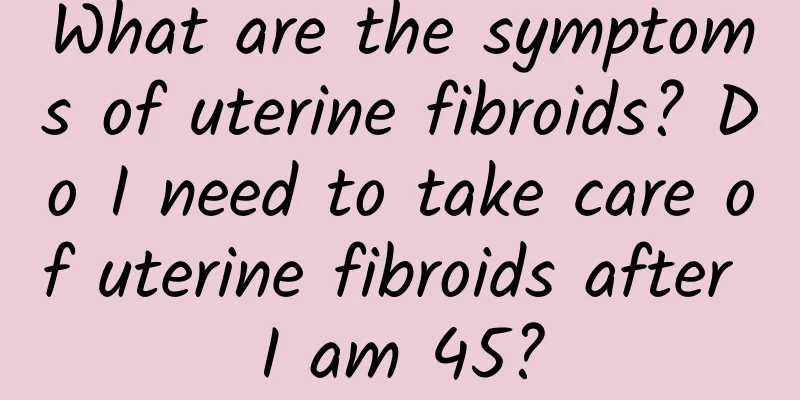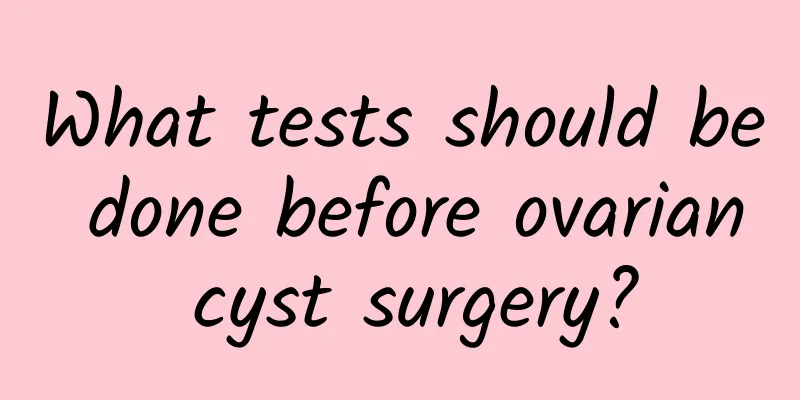What are the symptoms of uterine fibroids? Do I need to take care of uterine fibroids after I am 45?

|
What are the symptoms of uterine fibroids? Uterine fibroids are common benign uterine tumors in women, and their appearance may cause some potential problems for women's health. Knowing the precursor symptoms of uterine fibroids is crucial for early diagnosis and treatment. This article will introduce some common precursor symptoms of uterine fibroids and answer the question of whether you need to pay attention to uterine fibroids after the age of 45. Uterine fibroids are lumps that grow in the wall of a woman's uterus. They can appear alone or in groups. Uterine fibroids are usually benign, but sometimes they can become malignant, so early detection and treatment are critical. Symptoms of uterine fibroids can vary depending on their location, size, and number. Here are some common symptoms of uterine fibroids: 1. Abnormal menstruation: Uterine fibroids may cause excessive menstrual flow, prolonged menstrual periods, or shortened intervals between periods. Excessive pain, dysmenorrhea, and blood clots may also be symptoms of uterine fibroids. 2. Pelvic pressure: The growth of uterine fibroids may cause pelvic discomfort or pressure. Some women may experience back pain, frequent urination or difficulty in defecation. 3. Abdominal lumps: When uterine fibroids grow to a certain extent, one or more abdominal lumps may be felt when touched. These lumps are usually round and movable. If you experience the above symptoms, then there is a high chance that you are experiencing the precursors of uterine fibroids. It is very important to consult a doctor as soon as possible, as they can confirm the diagnosis based on your symptoms and physical examination. For women over 45 years old, do they need to pay attention to uterine fibroids? Age is not a reason not to pay attention to uterine fibroids. The occurrence of uterine fibroids is somewhat related to age, but it does not mean that you don't have to worry about it after the age of 45. In fact, the older you are, the higher the risk of uterine fibroids. More importantly, the development of uterine fibroids may have some adverse effects on women's physical health, such as menstrual disorders, anemia, infertility, etc. Therefore, no matter how old you are, women should pay attention to and detect uterine fibroids early. If you find that you have the precursor symptoms of uterine fibroids, you should consult a doctor as soon as possible and receive appropriate treatment. Doctors may use observation, drug therapy or surgery to treat uterine fibroids. The specific treatment plan needs to be determined according to individual circumstances. In short, the precursor symptoms of uterine fibroids include abnormal menstruation, pelvic pressure, and abdominal lumps. Although the risk of uterine fibroids increases after the age of 45, age does not mean that uterine fibroids do not need to be paid attention to. Regardless of age, women should pay close attention to their bodies and seek medical attention in time if they find abnormal symptoms. This way, uterine fibroids can be detected and treated earlier and their health can be protected. |
Recommend
What to do if infection occurs after abortion
Abortion is the most common way for modern women ...
Is sugar addictive? American scholars propose "sugar tax" control
Recently, strong cold air masses have been coming...
Prevention of uterine fibroids from five aspects
As a common gynecological disease, the incidence ...
What are the symptoms of ectopic pregnancy mass disappearance?
What are the symptoms of disappearance of ectopic...
Vulvar leukoplakia should be differentiated from sclerosing atrophic lichen
Vulvar leukoplakia is similar to lichen sclerosus...
Common surgical procedures for treating benign ovarian cysts
Surgery is an effective method for treating benig...
What causes pelvic inflammatory disease? It is related to physiological reasons
The onset of pelvic inflammatory disease is relat...
Hospitals for habitual abortion
For many new mothers who are pregnant, the arriva...
Causes of menstrual disorders after abortion
After artificial abortion, the ovaries can genera...
What are some ways to relieve dysmenorrhea?
During those days of the month, most girls will f...
Experts explain the symptoms of cervical erosion
Cervical erosion is a very common gynecological d...
Experts introduce common classification of cervical erosion
Clinically, different types of cervical erosion h...
What tests should be done for postmenopausal bleeding
Generally, women who have stopped menstruating fo...
What kind of inspection should be done for the flow of people?
Abortion mainly refers to artificial abortion sur...
Experts remind: the main causes of ectopic pregnancy
Ectopic pregnancy is a gynecological disease with...



![[Video version] Losing weight by cutting down on food and drink and dieting too much, menstruation has stopped ~ Shengmai Drink for conditioning](/upload/images/67dcf8f40c112.webp)





